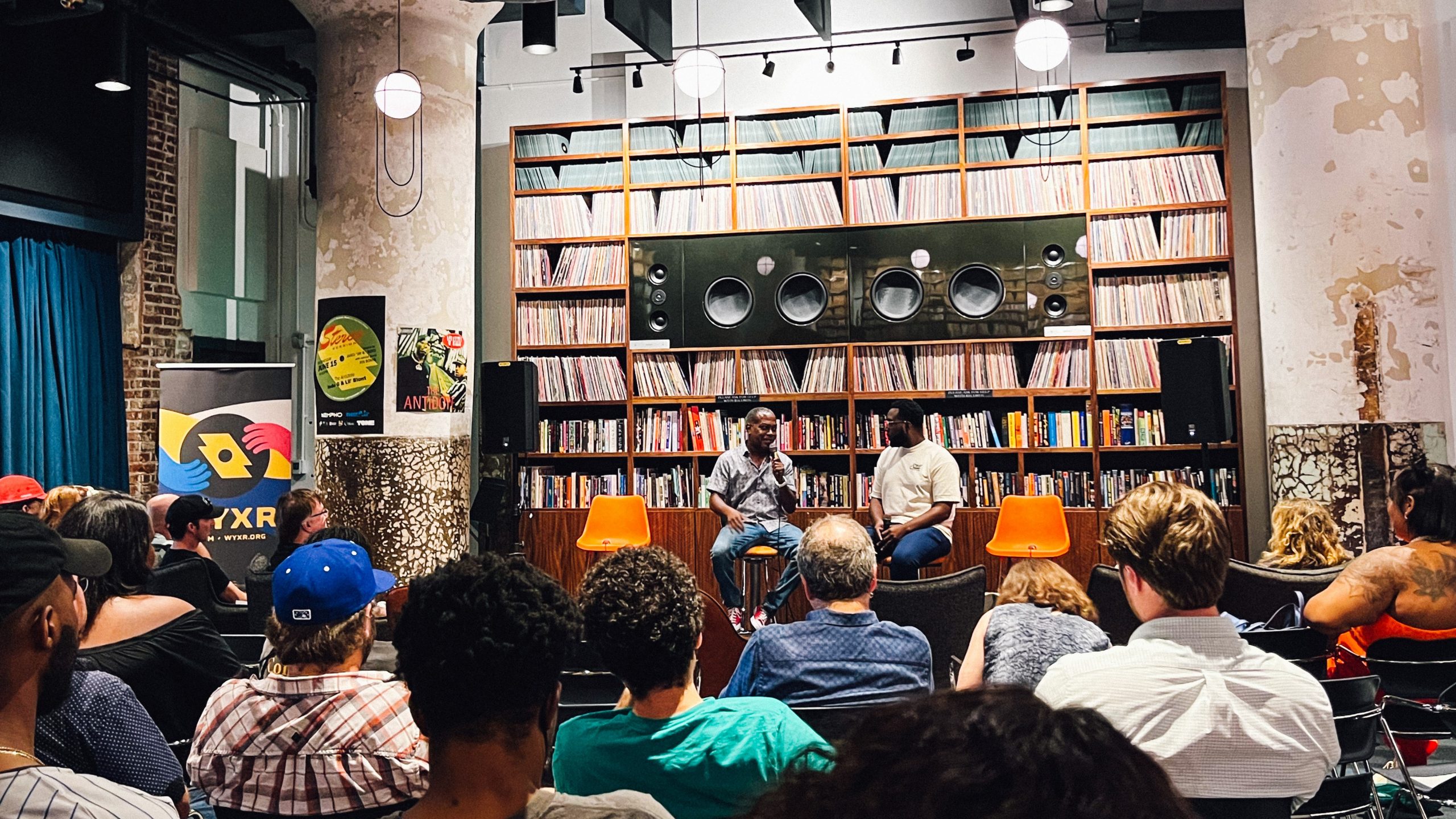WYXR Stereo Sessions: The Antidote
“How do we keep this going? How do we do this smart?” asked host Jared “Jay B” Boyd to close out the fifth installment of WYXR 91.7 FM’s series Stereo Sessions held at the Memphis Listening Lab on June 15. These questions were in regard to a newly developed interest in the Memphis hip-hop sound from the late 1980s and 1990s. Much of this interest was born overseas through amorphous and fast-moving online channels such as TikTok and YouTube—a bizarre second life for a moment in Memphis history.
This second life wouldn’t be possible if the first one wasn’t special and, despite the global interest in Memphis hip-hop, this event kept its focus around the interstate loop. Stereo Sessions is a monthly series presented by WYXR that focuses on underheard albums from Memphis artists, and this session featured a full listen-through of the 1994 album The Antidote from Memphis rappers Indo G and Lil’ Blunt. Memphis rappers Tom Skee Mask and Shawty Pimp, as well as DJ Jus Borne joined Jay B to discuss the album.
Like Memphis itself, the hip-hop from the city sits in the middle of the South’s larger context. With ties to the famous sounds and movements out of cities like Miami, Atlanta, and Houston, Memphis hip-hop can be difficult to pin down, but it is uniquely its own.
The Antidote embodies this spirit. Produced by S.M.K. (South Memphis King) and released by Miami-label Luke Records, the album blends sounds and lyrics rooted in Memphis with broader influences from across the South. The menacing organ on the intro track brings to mind the horror film-inspired music created by Memphis rappers beginning in the early 1990s, which is further echoed in dissonant progressions like on the hook of the song “Let’s Get Fucked Up.” The chant-like repetition on “Drop It Off Your Ass” hints at the Crunk sound germinating in Memphis at the time that would go on to be popularized by artists in Atlanta years later. Elsewhere the album incorporates sounds derived from other cities, nowhere more obviously than “Where Dem Doggs At,” which is directly in step with the fast-paced Miami sound Luke Records creator Uncle Luke was known for.
Though The Antidote was recorded and released by a significant hip-hop label in a different city, much of the hip-hop in Memphis was created with a Do-It-Yourself mentality—most rappers subsisted on a local economy of mixtape cassettes bought and sold at places like Mr. Z’s Sound Express in South Memphis. Without the formality of record labels, distribution, album art, or album credits, much of this history is only archived in the few surviving cassettes and the memories of those who made them. In discussing the album and 1990s Memphis hip-hop, the panel had a free-flowing, spirited debate as Tom Skee Mask, Shawty Pimp, and Jus Borne’s stories bounced off each other to bring the era to life. The three often refuted or expanded upon one another’s recollections or Jay B’s journalistic interpretations of that era of Memphis hip-hop, weaving a complicated yet enthralling narrative of an artform and legacy they helped build and care for intensely.


At the time this legacy was developing, the hip-hop world overlooked Memphis. Many of its key figures did not find success outside of the city and key sonic or stylistic inventions were made more famous by artists from other cities. Now that the music is being recognized in unlikely corners all over the world, it still has the risk of being overshadowed by those who are finding and reusing it. Jay B’s closing questions recognized that risk—with the world as an audience, how can the music and the money stay about Memphis? How can the city ensure the music’s second life does not betray its first? One answer is services provided by Memphis music professionals such as Angie Strange, who work to ensure that samples of Memphis songs used by other artists are cleared and the fair share of revenue generated from songs using these samples go to the original artists.
The virtues and influence of Memphis hip-hop are difficult to record or measure, and its place in history is perhaps just now approaching anything resembling consensus. Its legacy, though still unfolding, is valuable and at risk of being overlooked once again. Memphis hip-hop like Lil’ Blunt and Indo G’s The Antidote may be unruly, gripping, and decidedly underrated—all qualities that further iterate that it comes from Memphis.
Cover image by Kendra Petersen-Kamp.
Jordan Petersen-Kamp is a recent Memphis transplant originally from Grand Rapids, Michigan. He has worked as an accountant and freelance writer and also hosts and produces a podcast about the Redwall book series. He loves history, music, food, and drink and is excited to learn about all Memphis has to offer in those fields.

